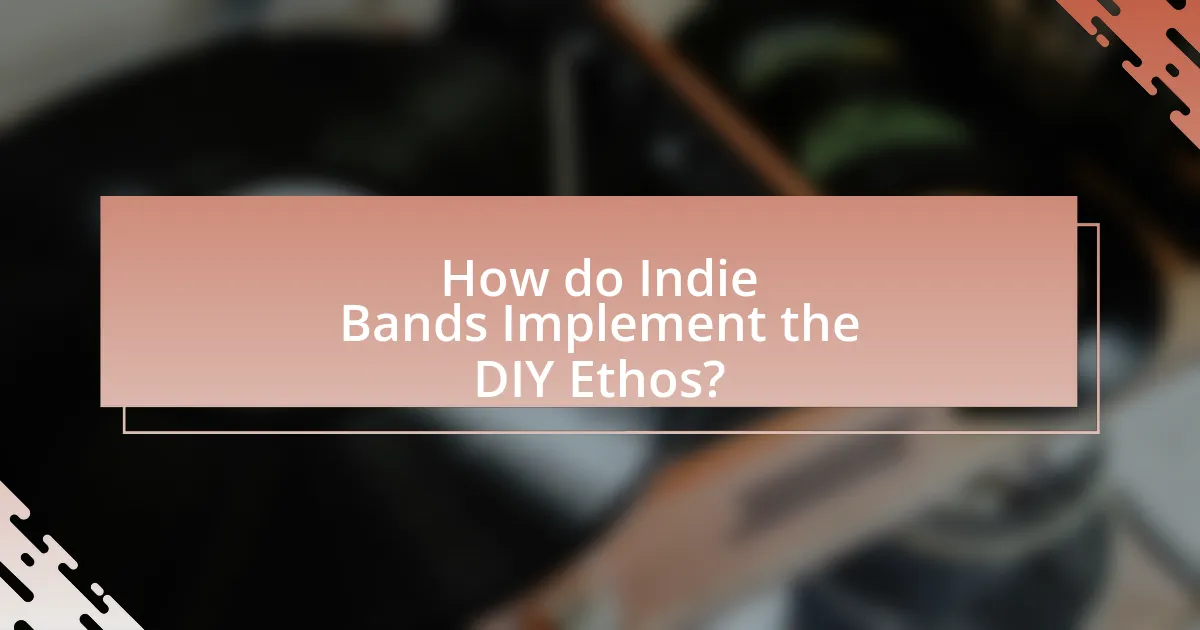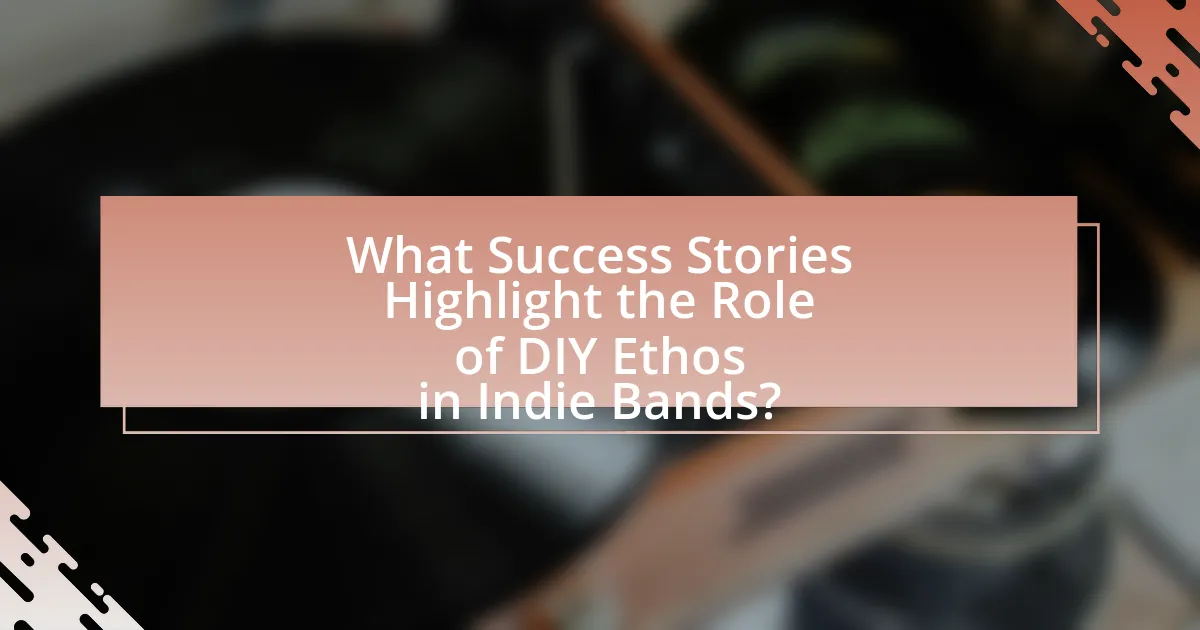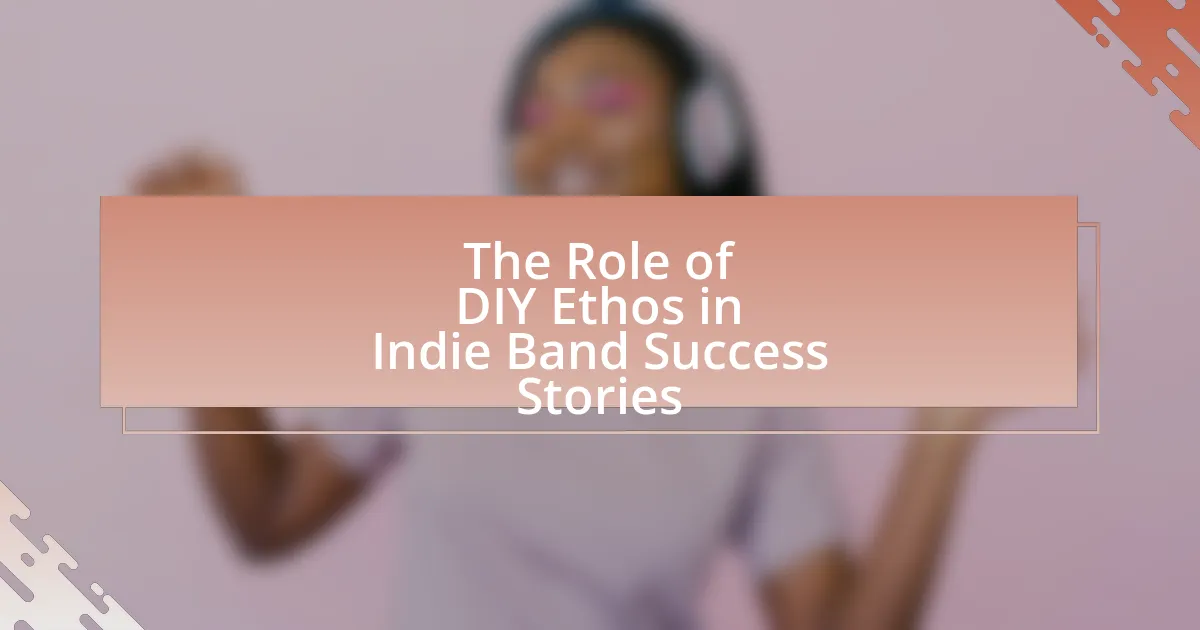The article examines the DIY ethos in the context of indie bands, highlighting its significance in fostering self-sufficiency and independence in music creation, distribution, and promotion. It traces the emergence of this ethos from the punk rock movement of the late 1970s and early 1980s, emphasizing how technological advancements and the internet have empowered artists to bypass traditional industry structures. Key practices associated with the DIY approach, such as self-production and grassroots marketing, are discussed, along with the challenges indie bands face and strategies for overcoming financial constraints. Success stories of notable bands like Death Cab for Cutie and The xx illustrate how a commitment to DIY principles can lead to artistic integrity and a dedicated fanbase.

What is the DIY Ethos in the Context of Indie Bands?
The DIY ethos in the context of indie bands refers to the principle of self-sufficiency and independence in music creation, distribution, and promotion. This approach allows indie bands to maintain creative control and authenticity, often leading to a more personal connection with their audience. Historically, many successful indie bands, such as Sonic Youth and The White Stripes, have exemplified this ethos by recording their music in home studios, self-releasing albums, and utilizing social media for promotion, thereby bypassing traditional music industry gatekeepers. This model has proven effective, as it fosters a dedicated fan base and encourages artistic experimentation, contributing significantly to the overall success of indie bands.
How did the DIY Ethos emerge in the music industry?
The DIY ethos emerged in the music industry primarily as a response to the commercialization and gatekeeping of major record labels. This movement gained momentum in the late 1970s and early 1980s, particularly within punk rock, where artists sought to create and distribute their music independently, rejecting mainstream norms. The advent of affordable recording technology and the rise of independent labels facilitated this shift, allowing musicians to produce, promote, and sell their work without relying on traditional industry structures. For example, bands like The Ramones and The Sex Pistols exemplified this ethos by self-producing their music and organizing their own tours, which inspired countless others to follow suit.
What historical events contributed to the rise of the DIY Ethos?
The rise of the DIY ethos was significantly influenced by the punk rock movement of the 1970s, which emphasized self-production and independence from major record labels. This movement encouraged musicians to create and distribute their own music, leading to the establishment of independent record labels and grassroots distribution methods. Additionally, the advent of affordable recording technology in the 1980s and 1990s further empowered artists to produce their work without corporate backing, fostering a culture of self-sufficiency. The internet boom in the late 1990s and early 2000s also played a crucial role, as it provided platforms for artists to share their music directly with audiences, bypassing traditional media channels. These historical events collectively contributed to the widespread acceptance and practice of the DIY ethos in the music industry.
How has technology influenced the DIY Ethos in music?
Technology has significantly influenced the DIY ethos in music by providing accessible tools for creation, distribution, and promotion. Digital audio workstations (DAWs), affordable recording equipment, and online platforms like Bandcamp and SoundCloud enable musicians to produce high-quality music independently. For instance, the rise of home recording technology has allowed artists like Chance the Rapper to release successful projects without traditional label support, demonstrating the effectiveness of the DIY approach. Additionally, social media platforms facilitate direct engagement with audiences, allowing musicians to build their fanbase without relying on major record labels. This shift has empowered countless indie artists to take control of their careers, leading to a more diverse and innovative music landscape.
Why is the DIY Ethos significant for indie bands?
The DIY ethos is significant for indie bands because it empowers them to maintain creative control and independence in their music production and distribution. This approach allows indie bands to cultivate a unique sound and identity without the constraints imposed by major record labels. For instance, bands like Death Cab for Cutie and The Decemberists initially thrived by self-releasing their music, which helped them build a dedicated fan base and establish their artistic vision. The DIY ethos also fosters community engagement, as indie bands often rely on grassroots marketing and local support, leading to stronger connections with their audience. This model has been validated by the success of numerous indie bands that have achieved commercial viability while adhering to DIY principles, demonstrating that artistic integrity can coexist with financial success.
What advantages does the DIY approach offer to indie musicians?
The DIY approach offers indie musicians greater creative control and financial independence. By managing their own production, distribution, and marketing, musicians can make artistic decisions that align with their vision without external pressures. This autonomy often leads to a more authentic sound and brand identity, which resonates with audiences. Additionally, the DIY model allows for higher profit margins since artists retain a larger share of revenue compared to traditional label contracts, where profits are typically split. According to a 2020 study by the Future of Music Coalition, indie musicians who adopt a DIY approach report increased satisfaction and engagement with their fanbase, further validating the effectiveness of this model in fostering success.
How does the DIY Ethos impact the creative process of indie bands?
The DIY ethos significantly enhances the creative process of indie bands by empowering them to take full control over their artistic output. This autonomy allows bands to experiment freely with their sound, leading to innovative music that reflects their unique identities. For instance, many successful indie bands, such as Death Cab for Cutie and The Decemberists, began by self-releasing their music, which fostered a strong sense of authenticity and connection with their audience. The DIY approach also encourages collaboration among band members and with other artists, resulting in diverse influences and richer musical compositions. Furthermore, the ability to manage their own production and distribution enables indie bands to maintain their vision without external pressures, ultimately contributing to their creative growth and success.

How do Indie Bands Implement the DIY Ethos?
Indie bands implement the DIY ethos by taking control of their music production, distribution, and promotion without relying on major record labels. This approach allows them to maintain artistic freedom and connect directly with their audience. For instance, many indie bands record their albums in home studios or local studios, which reduces costs and fosters a personal touch in their music. Additionally, they often use social media platforms and streaming services to distribute their music independently, bypassing traditional gatekeepers in the music industry. This method not only enhances their visibility but also builds a loyal fan base, as seen with bands like Arctic Monkeys, who gained popularity through online sharing before signing with a label.
What are the key practices associated with the DIY Ethos in indie music?
The key practices associated with the DIY ethos in indie music include self-production, independent distribution, and grassroots marketing. Self-production allows artists to create their music without relying on major record labels, exemplified by bands like Death Cab for Cutie, who initially recorded their albums in home studios. Independent distribution involves using platforms like Bandcamp and SoundCloud, enabling artists to reach audiences directly, as seen with artists like Chance the Rapper, who gained fame without a traditional label. Grassroots marketing focuses on building a fanbase through live performances, social media engagement, and community involvement, a strategy effectively utilized by bands such as The Decemberists, who cultivated a loyal following through extensive touring and personal interaction with fans. These practices collectively empower artists to maintain creative control and foster authentic connections with their audience.
How do indie bands manage their own production and distribution?
Indie bands manage their own production and distribution by utilizing a DIY approach that emphasizes self-sufficiency and resourcefulness. They often record music in home studios or collaborate with local producers to minimize costs, allowing them to maintain creative control over their sound. For distribution, indie bands frequently leverage digital platforms such as Bandcamp, Spotify, and social media to reach audiences directly, bypassing traditional record labels. This method not only reduces expenses but also fosters a closer connection with fans. According to a 2020 report by the International Federation of the Phonographic Industry, independent artists accounted for 40% of global music consumption, highlighting the effectiveness of their self-managed strategies in the current music landscape.
What role does social media play in promoting DIY indie bands?
Social media plays a crucial role in promoting DIY indie bands by providing a platform for direct engagement with fans and facilitating the sharing of music and content. This accessibility allows indie bands to reach a global audience without the need for traditional record label support. For instance, platforms like Instagram and TikTok enable bands to showcase their music, share behind-the-scenes content, and connect with listeners in real-time, which can lead to increased fan loyalty and grassroots support. According to a 2021 report by the International Federation of the Phonographic Industry, 70% of music consumers discover new artists through social media, highlighting its effectiveness as a promotional tool for indie bands.
What challenges do indie bands face when adopting a DIY approach?
Indie bands face several challenges when adopting a DIY approach, primarily including limited financial resources, lack of industry connections, and the need for diverse skill sets. Financial constraints often hinder their ability to produce high-quality recordings and promote their music effectively. Additionally, without established industry connections, indie bands struggle to secure gigs, media coverage, and distribution channels, which are crucial for reaching wider audiences. Furthermore, the DIY model requires bands to manage various aspects of their careers, such as marketing, booking, and production, which can overwhelm members who may not possess the necessary expertise in these areas. These challenges collectively impact their ability to achieve commercial success and visibility in a competitive music landscape.
How can indie bands overcome financial constraints in a DIY model?
Indie bands can overcome financial constraints in a DIY model by leveraging crowdfunding platforms, utilizing social media for marketing, and collaborating with local businesses for sponsorships. Crowdfunding platforms like Kickstarter and Indiegogo allow bands to raise funds directly from fans, with successful campaigns often exceeding their financial goals; for instance, the band “The Decemberists” raised over $300,000 for their album through Kickstarter. Social media enables bands to promote their music and merchandise at minimal cost, reaching a wider audience without traditional advertising expenses. Collaborating with local businesses can provide mutual benefits, such as venue space for performances in exchange for promotion, which has been shown to enhance community support and increase revenue streams for indie bands.
What are common pitfalls for indie bands pursuing a DIY strategy?
Common pitfalls for indie bands pursuing a DIY strategy include inadequate marketing, poor financial management, and lack of professional networking. Many indie bands underestimate the importance of effective marketing, leading to limited audience reach and visibility. Financial mismanagement often results from a lack of budgeting skills, which can jeopardize the band’s sustainability. Additionally, without professional networking, indie bands may miss opportunities for collaborations, gigs, and industry connections that are crucial for growth. These pitfalls can hinder the overall success of the band in a competitive music landscape.

What Success Stories Highlight the Role of DIY Ethos in Indie Bands?
Success stories that highlight the role of DIY ethos in indie bands include the rise of bands like Death Cab for Cutie and The xx. Death Cab for Cutie initially gained popularity through self-released albums and grassroots promotion, leading to their eventual signing with a major label while maintaining their independent spirit. The xx, known for their minimalist sound, recorded their debut album in a small bedroom studio and utilized social media for promotion, which contributed to their rapid success and critical acclaim. These examples demonstrate how a DIY approach can effectively foster creativity, community engagement, and sustainable growth in the indie music scene.
Which notable indie bands have thrived through a DIY approach?
Notable indie bands that have thrived through a DIY approach include Death Cab for Cutie, Modest Mouse, and Arcade Fire. Death Cab for Cutie initially released their music on independent labels, gaining a dedicated fanbase through grassroots promotion and touring. Modest Mouse achieved success with their album “The Lonesome Crowded West,” which was released on an independent label and helped them build a strong following. Arcade Fire’s debut album “Funeral” was self-released, and their unique sound and community-driven marketing contributed to their rise in the indie music scene. These bands exemplify how a DIY ethos can lead to significant success in the music industry.
What strategies did these successful bands employ to achieve recognition?
Successful bands employed a variety of strategies to achieve recognition, primarily leveraging a DIY ethos that emphasized self-promotion, grassroots marketing, and community engagement. For instance, many indie bands utilized social media platforms to connect directly with fans, share their music, and build a loyal following without relying on traditional record labels. This approach is supported by data showing that bands like Arctic Monkeys gained significant attention through their MySpace presence, leading to a record deal based on their online popularity. Additionally, successful bands often performed at local venues and festivals, creating a strong local presence that helped them gain traction and visibility in the music scene. This strategy is evidenced by the rise of bands like The Lumineers, who built their reputation through extensive touring and live performances, ultimately leading to wider recognition and commercial success.
How did their DIY ethos shape their artistic identity and fanbase?
Their DIY ethos significantly shaped their artistic identity and fanbase by fostering authenticity and independence in their creative process. This approach allowed them to maintain control over their music, visuals, and branding, which resonated with fans seeking genuine connections. For instance, bands like Death Cab for Cutie and The Decemberists built their reputations through self-released albums and grassroots marketing, cultivating loyal followings that appreciated their commitment to artistic integrity. This authenticity not only differentiated them from mainstream acts but also created a community of fans who valued the personal and relatable nature of their work.
What lessons can emerging indie bands learn from these success stories?
Emerging indie bands can learn the importance of a strong DIY ethos from successful indie acts, which emphasizes self-reliance and creative control. Successful bands like Death Cab for Cutie and The xx built their careers by independently producing music and engaging directly with their fanbase, demonstrating that maintaining artistic integrity can lead to a loyal following. Additionally, these bands utilized social media and grassroots marketing strategies to promote their work, showing that effective communication and community engagement are crucial for growth. The success of these bands illustrates that a commitment to authenticity and direct fan interaction can significantly enhance an indie band’s visibility and success in a competitive music landscape.
What best practices should new indie bands adopt from successful DIY artists?
New indie bands should adopt a strong online presence, effective grassroots marketing, and a commitment to artistic authenticity from successful DIY artists. Successful DIY artists leverage social media platforms to engage with fans directly, build a community, and promote their music without relying on traditional record labels. For instance, artists like Chance the Rapper have utilized platforms like SoundCloud and social media to distribute their music and connect with audiences, leading to significant commercial success without a major label. Additionally, DIY artists often organize their own tours and events, fostering local support and creating unique experiences for fans, which enhances their visibility and fan loyalty. This approach not only builds a dedicated fan base but also allows for creative control over their music and branding.
How can aspiring indie musicians leverage the DIY Ethos for their own success?
Aspiring indie musicians can leverage the DIY ethos for their success by taking control of their music production, distribution, and marketing. This approach allows them to create authentic content that resonates with their audience while minimizing costs. For instance, many successful indie artists, such as Chance the Rapper, have utilized platforms like Bandcamp and social media to distribute their music directly to fans, bypassing traditional record labels. This strategy not only fosters a closer connection with listeners but also retains a larger share of revenue. Additionally, the DIY ethos encourages musicians to develop skills in various areas, such as recording, graphic design, and social media management, which enhances their overall artistic independence and marketability.


